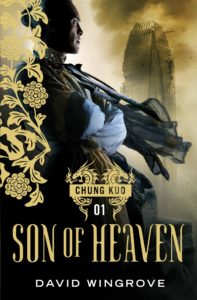I remember seeing David Wingrove’s Chung Kuo books back in the 1980s and 1990s. They looked like a big, pulpish series set in a future dominated by China. A little while back, I picked up Son of Heaven, which says it’s Chung Kuo #1, thinking I would look in on this series and maybe set to reading the whole thing. I had a quick look at the publishing history of the series, in part to check buying options, and I found out that history is more complicated than I would have expected.
In its first incarnation, Chung Kuo was published as eight volumes (although Wikipedia maintains that Wingrove planned a ninth to make the whole a trilogy of trilogies, and his publisher pressured him to wrap it up in the eighth) between 1988 and 1999. A “re-casting” of the epic began in 2011, with Wingrove planning an expansion to 20 volumes. The Middle Kingdom, which had originally been the first book, became the third, with Son of Heaven appearing as the first. This is the edition that I bought and read. This publication set also ended after eight volumes. The final book in the 2011–15 set was The White Mountain, which was the title of the third in the original series. Since 2017, Wingrove has been self-publishing the series and reached the eleventh volume, Upon a Wheel of Fire, in July 2019. The twelfth, Beneath the Tree of Heaven, shares a title with the fifth book in the original published set.
I bring all of this up to note that Wingrove is working on a large scale. About a third of Son of Heaven is set in the 2040s, with some characters recalling events from the present (which of course was a bit in the future when Wingrove was writing this novel), while the latest book in the series is set in the early 2200s. His plans encompass more than doubling the original eight-volume set, and it seems very likely that the economics of self-publishing, in contrast to those (and various other vagaries, no doubt) of trade publishing, will allow him to complete his epic. I bring it up also to note that Son of Heaven, along with the next book in the set, Daylight on Iron Mountain, are both prequels to where Wingrove originally started the main action of Chung Kuo.
All of that said, 434 pages are a lot for what is effectively a “What Has Gone Before” introduction to the series. By The Middle Kingdom, China rules the world and nearly all humans live in mile-high megastructures, with social status reflected in the height at which one lives. Son of Heaven tells part of how the world got that way. The book takes place in England and is divided into three parts, with the first and third set in 2065, and the second in 2043. The chronologically earlier section shows how the technologically advanced, interconnected world collapsed into the semi-post-apocalypse shown in the book’s initial chapters. The first section shows the fallen world, portraying an England that has collapsed into a series of village societies, held together by tenuous links of trade, polities smaller than in pre-Saxon Britain, and a surprising number of guns and bullets. The third part portrays part of what happens when the Chinese finally show up.
For me, the book fell deeply into the uncanny valley between pulpy adventure tales and a novel that had serious things to say about power and civilization. As a result, it tried too hard to be deep for its adventure to be something that I could just accept and come along for the ride, but the attempts at seriousness struck me as too improbable to accept. Wingrove’s world of 2043 is somewhat plausible from the perspective of 2019, although the vision of VR immersion in financial markets owes more to the cyberpunk visions of the 1980s when Wingrove was first writing Chung Kuo than to anything that fintech is developing or has its sights on. The coup that sets the whole series into motion struck me as utterly implausible. The main character Jake’s perspective that the technological world deserved to fall strikes me as morally indefensible, given how many hundreds of millions of deaths it entailed. The notion that England would survive such a collapse and 22 years later be semi-settled into a rustic world of farmers and deference and ye olde pub unsuspended my disbelief on a regular basis while reading. That people in the 2060s would still have sentimental attachment to the pop music of the 1960s, or that they would refer to internet entities of the early 2010s were just two flavors of icing on that particular cake.
There are some good things about the book. The portrayal of the friendship between Jake and Tom, particularly how it is formed at Jake’s arrival in a village when everything is in mid-collapse, is touching. Some of the small-town dynamics are nicely observed, and some of the ways that people fail to forget the old world are well done.
In due course the Chinese do appear and upend the cozy apocalypse that Jake has going. He’s swept up in their machinations because he’s still on a list of key players from just before the collapse, and the institutions that the Chinese bring with them have long memories. I presume that Jake has a role to play in at least the second prequel, if not in the third book when the main story actually begins. Maybe that would have been a better place for me to start reading Chung Kuo, rather than with something that is so clearly just a warm-up act.

